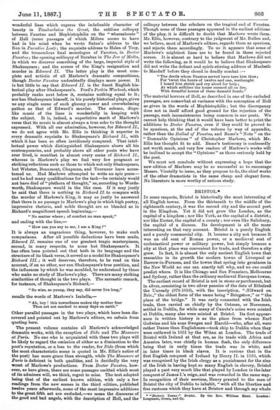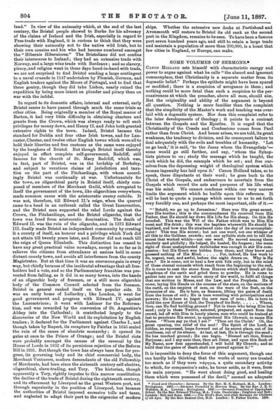BRISTOL.*
some respects, Bristol is historically the most interesting of all English towns. From the thirteenth to the middle of the eighteenth century, it was the second city and the second port in the Kingdom. Yet it did not grow like London, as the capital of a kingdom ; nor like York, as the capital of a district ; nor like Exeter, the capital of a county ; nor even like Salisbury, the capital of a diocese. Its development is all the more interesting on that very account. Bristol is a purely English and a purely commercial city. It became a city not because it was an old seat of Roman power, or a mediaaval seat of ecclesiastical power or military power, but simply because a city at that place was convenient for trade, and therefore a city grew. In fact, it is almost the only ancient English town that resembles in its growth the modern towns of Liverpool or Barrow-in-Farness, and the towns that spring into greatness in the New World no one can exactly tell why, and no one could predict where. It is like Chicago and San Francisco, Melbourne and Sydney, rather than the ordinary mediasval European towns.
The earliest record of Bristol is not in stone or parchment, but in silver, consisting in two silver pennies of the date of Ethelred the 'Unready (978.1016), with the inscription, "2Elfward on Brie.," the oldest form of the name being " Bricgstow," or " the- place of the bridge." It was early connected with the Irish trade, then carried on chiefly by the Ostmen, or Norsemen, settled in Dublin, for while many of Canate's coins were minted at Dublin, many also were minted at Bristol. Its first appear- ance in written history is as the place from whence Earl Clodwine and his sons Swegen and Harold—who, after all, were rather Danes than Englishmen—took ship to Dublin when they were outlawed in 1051 by the Witan at London. The trade of Bristol with Ireland at that era, as its trade with Africa and America later, was chiefly in human flesh, the only difference being that in early times the trade was in white, and in later times in black slaves. It is curious that in the first English conquest of Ireland by Henry II. in 1166, which was recognised by the Irish clergy as a punishment for the sins. of the Irish in having kept so many English in slavery, Bristol played a part very much like that played by London in the later conquest of James L's reign, and was rewarded in the same way. In recognition of their services, Henry granted to the men of Bristol the city of Dublin to inhabit, "with all the liberties and free customs which they have at Bristow and through my whole • “Herterie Towns:" Bristol. By the Bor. William Hunt. London: Longraane, Green, and Os.
land." In view of the animosity which, at the end of the last century, the Bristol people showed to Burke for his advocacy of the claims of Ireland and the Irish, especially in regard to Free-trade with England, it is curious to think that they were showing their animosity not to the native wild Irish, but to their own cousins and kin who had become numbered amongst the " Hibernis Hiberniores." The Bristolians did not confine their intercourse to Ireland ; they had an extensive trade with Norway, and a large wine trade with Bordeaux ; and as slavery, piracy, and religion went in those days hand-in-hand with trade, we are not surprised to find Bristol sending a large contingent to a naval crusade in 1147 undertaken by Flemish, German, and English traders against the Moors of Portugal, and to find that these gentry, though they did take Lisbon, nearly ruined the expedition by being more intent on plunder and piracy than on war with the infidel.
In regard to its domestic affairs, internal and external, early Bristol seems to have passed through much the same trials as other cities. Being originally a member of the Royal manor of Barton, it had very little difficulty in obtaining charters and grants from the Crown, which was always ready to sell such privileges for money down, and Henry IL and John both granted extensive rights to the town. Indeed, Bristol became the standard for Dublin and four other Irish towns, and for Lan- caster, C heater, and twelve other English towns which were all to hold their liberties and free customs as the same were enjoyed by the burghers of Bristol. But though Bristol itself thereby enjoyed in effect complete self-government, Redcliff, still famous for the church of St. Mary Redcliffi which was, in fact, part of Bristol, was in the lordship of Berkeley, and subject to vexatious claims of jurisdiction and taxa- tion on the part of the Fitzhardings, with whom accord- ingly Bristol was continually at war. Unfortunately for the town, an oligarchical party in Bristol itself, chiefly com- posed of members of the Merchant Guild, which arrogated to itself the government of the town, like oligarchism everywhere, made common cause with the aristocratic enemy outside. It was not, therefore, till Edward IL's reign, when the quarrel came to a head in an outbreak called the Great Insurrection, and the Bristol men supported the rebel Lords against the Crown, the Fitzhardings, and the Bristol oligarchs, that the town was freed from aristocratic domination. The death of Edward IL was the ruin of the oligarchs, and in 1373 Edward IIL finally made Bristol an independent community by creating it a county of itself, an honour and a privilege which York did not attain till twenty years later, and Exeter did not reach till the reign of Queen Elizabeth. This distinction has ceased to have any great practical value nowadays, except in so far as it relieves the citizens from attendance at assizes held in some distant county town, and avoids all interference from the county Magistrates. But at that time it was an enormous gain in every way, but chiefly because of the incidental advantage that all free- holders had a vote, and so the Parliamentary franchise was pre- vented from falling, as it did in so many towns, into the hands of an oligarchic body of freemen, or a still more oligarchic body of the Common Council selected from the freemen. Bristol in general ranked itself on the popular side. It was an early home of Lollardry ; like London, it went for good government and progress with Edward IV. against the Lancastrians; it went with Latimer for the Reforma- tion, and was rewarded by the conversion of St. Augustine's Abbey into the Cathedral ; it contributed largely to the discoveries of the New World and its exploitation by English traders ; it declared for the Parliament against Charles L, and though taken by Rupert, its recapture by Fairfax in 1645 sealed the ruin of the cause of absolute monarchy ; it opened its gates at once to the Prince of Orange ; and the Bristol riots were probably amongst the causes of the reversal by the House of Lords in 1832 of its pernicious rejection of the Reform Bill in 1831. But though the town has always been firm for pro- gress, its governing body and its chief commercial body, the Merchant Venturers, modern descendants of the old Fellowship of Merchants, had been since the sixteenth century self-elective, oligarchical, slave-trading, and Tory. The historian, though apparently a Tory, rightly imputes to this narrow constitution the decline of the trade of Bristol during the eighteenth century, and its effacement by Liverpool as the great Western port, not through superiority in the position of Liverpool, but because the authorities of Bristol imposed excessive tolls and taxes, and neglected to adapt their port to the exigencies of modern ships. Whether the extensive new docks at Portiahead and Avonmouth will restore to Bristol its old rank as the second port in the Kingdom, remains to be seen. To have been a famous port seven hundred years ago, and still to retain a large trade and maintain a population of more than 200,000, is a boast that few cities in England, or Europe, can make.



































 Previous page
Previous page